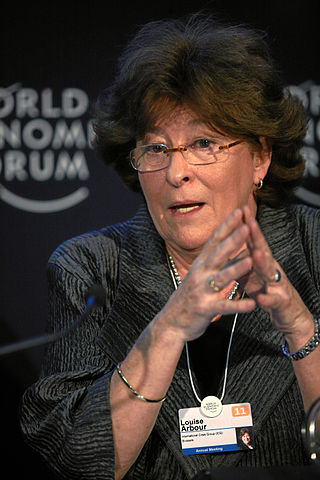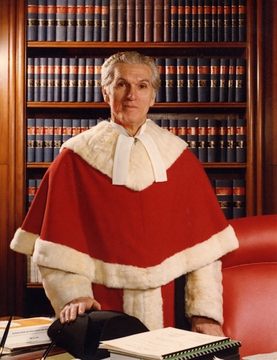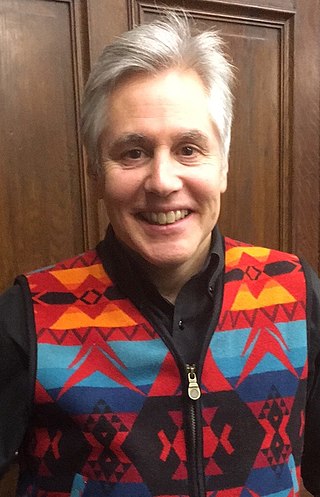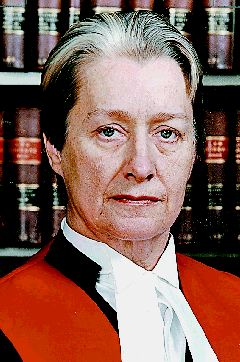Related Research Articles

Louise Arbour, is a Canadian lawyer, prosecutor and jurist.

The Supreme Court of Canada is the highest court in the judicial system of Canada. It comprises nine justices, whose decisions are the ultimate application of Canadian law, and grants permission to between 40 and 75 litigants each year to appeal decisions rendered by provincial, territorial and federal appellate courts. The Supreme Court is bijural, hearing cases from two major legal traditions and bilingual, hearing cases in both official languages of Canada.
Section 33 of the Canadian Charter of Rights and Freedoms is part of the Constitution of Canada. It is commonly known as the notwithstanding clause. Sometimes referred to as the override power, it allows Parliament or provincial legislatures to temporarily override sections 2 and 7–15 of the Charter.

Osgoode Hall Law School, commonly shortened to Osgoode, is the law school of York University in Toronto, Ontario, Canada. It is home to the Law Commission of Ontario, the Journal of Law and Social Policy, and the Osgoode Hall Law Journal. A variety of LL.M. and Ph.D. degrees in law are available.
The Law Society of Ontario is the law society responsible for the self-regulation of lawyers and paralegals in the Canadian province of Ontario. Founded in 1797 as the Law Society of Upper Canada, its name was changed by statute in 2018.

Bora Laskin was a Canadian jurist who served as the 14th chief justice of Canada from 1973 to 1984. Laskin was appointed a puisne justice of the Supreme Court in 1970, and served on the Ontario Court of Appeal from 1965 to 1970. Before he was named to the bench, Laskin worked as a lawyer and in academia.

Herbert Allan Borden Leal, was a Canadian civil servant and academic. He was Deputy Attorney General of Ontario, dean of Osgoode Hall Law School, and chancellor of McMaster University.
Alan N. Young is Professor Emeritus of law at Osgoode Hall Law School in Toronto, Ontario, Canada. Young retired July 2018. Prior to starting his teaching career at Osgoode in 1986, Young clerked for Chief Justice Bora Laskin of the Supreme Court of Canada and worked as a criminal lawyer in Toronto.
Beth Symes,, Queen's University alumna is a Canadian lawyer who fought the Canada Revenue Agency all the way to the Supreme Court of Canada in an unsuccessful attempt to deduct childcare expenses she incurred in order to earn income as a partner in her law firm.
Marilou McPhedran is a Canadian lawyer, human rights advocate and politician. Since October 2016, McPhedran is a member of the Senate of Canada.
Janet E. Minor is a former Treasurer of the Law Society of Upper Canada.

Women in law describes the role played by women in the legal profession and related occupations, which includes lawyers, paralegals, prosecutors, judges, legal scholars, law professors and law school deans.

Women work in the legal profession and related occupations throughout Canada, as lawyers, prosecutors, judges, legal scholars, law professors and law school deans. In Canada, while 37.1% of lawyers are women, "50% ...said they felt their [law] firms were doing "poorly" or "very poorly" in their provision of flexible work arrangements". It was also reported that, in 2006 in Ontario, "racialized women accounted for 16% of all lawyers under 30" and that only 1% of lawyers were Aboriginal.
Paul B. Schabas is a judge of the Ontario Superior Court of Justice.
M. David Lepofsky is a Canadian academic, retired lawyer, disability advocate. Blind for much of his life, Lepofsky was named one of Canada's most influential lawyers in 2010.
Avvy Yao-Yao Go is a Canadian lawyer and judge. She is known for her work advocating on behalf of immigrant and racialized communities in Canada. In 2014 she was appointed to the Order of Ontario. In August 2021, Go was appointed to the Federal Court.
Malliha Wilson is a Tamil Canadian lawyer who served as an Assistant Deputy Attorney General of the Government of Ontario from April 2008 to November 2016.

John Borrows is a Canadian academic and jurist. He is a full Professor of Law and the Loveland Chair in Indigenous Law at the University of Toronto Faculty of Law. He is known as a leading authority on Canadian Indigenous law and constitutional law and has been cited by the Supreme Court of Canada. John Borrows is a member of the Church of Jesus Christ of Latter-day Saints.

Mary Frances Southin is a retired Canadian judge. She was the first woman to become a Queen's Counsel in British Columbia, to be elected a Bencher of the Law Society of British Columbia, and to be a head of a law society in the Commonwealth. She was a Justice of the British Columbia Court of Appeal from 1988 to 2006.
Michelle O'Bonsawin is a Canadian jurist serving as a puisne justice on the Supreme Court of Canada since September 1, 2022. Before her appointment to the Supreme Court, she served as a judge on the Ontario Superior Court of Justice from 2017 to 2022. O'Bonsawin is the first Indigenous Canadian to serve as a Supreme Court justice.
References
- 1 2 "Law vs. Justice: How the Courts are preparing the way for one last, fatal, round of treaty negotiations with Indigenous Peoples in Canada". mcgill.ca. 2013. Retrieved November 10, 2019.
- 1 2 "Advisory Committee". theequalityeffect.org. 16 September 2013. Archived from the original on January 18, 2019. Retrieved November 10, 2019.
- 1 2 3 "Constitutional Roundtable: Mary Eberts". law.utoronto.ca. November 18, 2014. Retrieved November 9, 2019.
- ↑ "Asper Centre's 10th Anniversary Celebration". aspercentre.ca. October 17, 2018. Retrieved November 9, 2019.
- 1 2 Sheinin, Rose (November 1993). "Honorary degree citation - Mary Eberts". concordia.ca. Retrieved November 9, 2019.
- ↑ Flanagan, Thomas E. (1986). "Equality Rights and the Canadian Charter of Rights and Freedoms, Anne F. Bayefsky and Mary Eberts, eds., Toronto: Carswell, 1985, pp. xliv, 661". Canadian Journal of Law and Society. 1: 174–176. doi:10.1017/S0829320100001058. S2CID 147393775 . Retrieved November 10, 2019.
- ↑ "Supreme Court Judgments". scc-csc.lexum.com. Retrieved November 9, 2019.
- ↑ "Tax Talk Nancy Staudt" (PDF). ctf.ca. 2003. p. 1935. Retrieved November 9, 2019.
- ↑ "Elected, Life and Emeritus Benchers of the Law Society of Ontario". lso.ca. Retrieved November 9, 2019.
- ↑ "Governor General Awards in Commemoration of the Persons Case - Status of Women Canada". cfc-swc.gc.ca. 26 November 2020. Retrieved 2022-11-21.
- ↑ Manfredi, Christopher P. (2005). Feminist Activism in the Supreme Court: Legal Mobilization and the Women's Legal Education and Action Fund. UBC Press. p. 33. ISBN 9780774809474 . Retrieved November 10, 2019.
- ↑ "Chinese families seek head tax compensation". cbc.ca. June 10, 2002. Retrieved November 10, 2019.
- ↑ "Osgoode Hall Law School announces new faculty appointments, visiting fellowships and artists in residence". news.yorku.ca. June 16, 2015. Retrieved November 10, 2019.
- ↑ "MS. MARY EBERTS, O.C." gg.ca. Retrieved November 9, 2019.